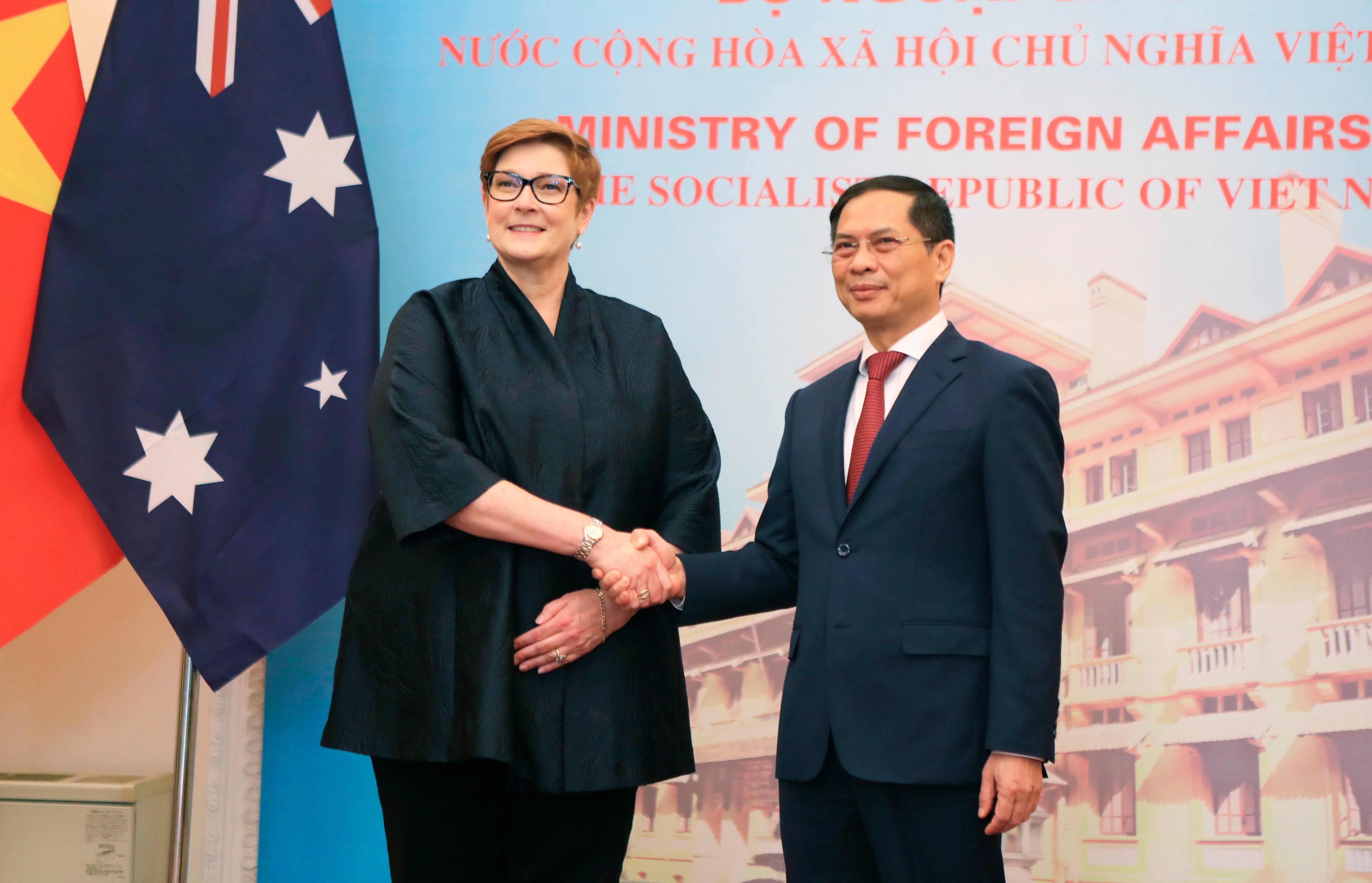Submission by Human Rights Watch to Australia-Vietnam Human Rights Dialogue
Human Rights Watch appreciates the opportunity to contribute to the preparations for the 17th Australia-Vietnam Human Rights Dialogue, scheduled to be held virtually on December 8, 2021.

Australia’s bilateral relationship with Vietnam has continued to grow in recent years. In 2021, Australia was one of the top 10 trade partners with Vietnam. In November, during a visit to Hanoi, Minister of Foreign Affairs Marise Payne confirmed “that Australia considers Vietnam a priority in various matters, including infrastructure development, agriculture, poverty reduction and climate change.” Unfortunately, Minister Payne did not publicly mention Vietnam’s abysmal human rights record, which seriously worsened during the Covid-19 pandemic. In 2021 alone, the Vietnamese authorities arbitrarily arrested at least 30 people for criticizing the government or joining independent organizations or religious groups. Australia’s close ties with Vietnam provide Canberra with the opportunity and responsibility to speak out about Vietnam’s systematic suppression of fundamental civil and political rights, including freedom of expression, association, peaceful assembly, and religion and belief.
The Communist Party of Vietnam monopolizes power through the government, controls all major political and social organizations, and punishes people who dare to criticize or challenge its rule. Independent media do not exist as the government controls TV, radio, newspapers, and other publications. Vietnam prohibits the formation of independent labor unions, political associations, and human rights organizations. Police frequently use excessive force to disperse peaceful public protests that criticize the government. Activists questioning government policies or projects, or seeking to defend local resources or land, face daily harassment, intrusive surveillance, house arrest, travel bans, arbitrary detention, and abusive interrogation. Police subject dissidents to lengthy interrogations that sometimes include torture, and detain them incommunicado for months without access to legal counsel. Communist Party-controlled courts receive instructions on how to rule in politically motivated criminal cases, and have issued increasingly harsh prison sentences for activists convicted on bogus national security charges.
The police monitor, harass, and sometimes violently crack down on religious groups operating outside government-controlled structures and institutions. Unrecognized branches of the Cao Dai church, Hoa Hao Buddhist church, independent Protestant and Catholic house churches, Khmer Krom Buddhist temples, and the Unified Buddhist Church of Vietnam face constant surveillance, harassment, and intimidation. Followers of independent religious groups are subject to public criticism, forced renunciation of faith, detention, interrogation, torture and other ill-treatment, and imprisonment. Vietnam’s highly problematic law on cybersecurity requires service providers to take down content that offends the authorities within 24 hours of receiving their request, tightening already-severe restrictions on access to information. Internet companies are also required to store data locally, verify user information, and disclose user data to authorities on demand without a court order, all of which threaten the right to privacy and could facilitate further reprisals against dissidents and activists. Human Rights Watch strongly recommends that Australia urge Vietnam to quash convictions and release all political prisoners. Australia should also press Vietnam to drop charges and release political detainees held in pre-trial detention. Australia should place human rights concerns at the center of all its engagements with Vietnam instead of relegating those concerns to just one bilateral dialogue per year. As of December 2021, Human Rights Watch has documented that at least 146 people are behind bars for exercising their basic rights, including prominent rights activists and bloggers such as Tran Huynh Duy Thuc, Pham Chi Dung, Nguyen Tuong Thuy, Pham Chi Thanh, Can Thi Theu, Le Dinh Luong, Truong Minh Duc, Nguyen Trung Ton, Pham Van Troi, Hoang Duc Binh, Tran Anh Kim, Pham Van Diep, Tran Duc Thach, Nguyen Trung Truc, Ho Duc Hoa, and others. Australia citizen Chau Van Kham remains in a Vietnamese prison since January 2019 on terrorism charges for his involvement in a peaceful international political organization focused on Vietnam, Viet Tan. Securing his release, and ability to leave the country and return to Australia to be reunited with his family should be a top priority for Australia in the forthcoming dialogue. Vietnam frequently uses vaguely worded and loosely interpreted provisions in its Penal Code to imprison political and religious activists.
These include “carrying out activities aimed at overthrowing the people’s administration” (article 109), “undermining the unity policy” (article 116), “making, storing, disseminating or propagandizing information, materials and products that aim to oppose the State of the Socialist Republic of Vietnam” (article 117), and “disrupting security” (article 118). Vietnam also uses other articles in the penal code to target rights campaigners, including “abusing the rights to democracy and freedoms to infringe upon the interests of the State, the legitimate rights and interests of organizations, individuals” (article 331) and “disrupting public order” (article 318). Vietnam’s Criminal Procedure Code contravenes international human rights standards by stipulating that government prosecutors can hold suspects of “national security” crimes in detention (article 173(5)) and restrict their access to legal counsel (article 74) until after investigation is concluded. In practice, this means that those accused of violating national security laws are held in police custody without access to a lawyer for as long as the authorities want. Police arrested land rights activists Trinh Ba Phuong and Nguyen Thi Tam in June 2020, but it was not until July 2021 that Trinh Ba Phuong was allowed to see a defense lawyer. Prominent blogger Pham Doan Trang was arrested on October 6, 2020, and was allowed to see a defense lawyer for the first time only on October 19, 2021. Australia should publicly and privately call on the Vietnamese government to:.
Read the full article at the original website
References:
- https://dangcongsan.vn/kinh-te-va-hoi-nhap/uc-tro-thanh-1-trong-10-doi-tac-thuong-mai-lon-nhat-cua-viet-nam-592395.html
- https://en.vietnamplus.vn/prime-minister-pham-minh-chinh-hosts-australian-minister/214182.vnp
- https://www.hrw.org/video-photos/interactive/2021/05/07/free-vietnams-political-prisoners
- https://www.hrw.org/news/2020/06/19/vietnam-crackdown-peaceful-dissent-intensifies
- https://www.hrw.org/news/2021/07/08/vietnam-free-prominent-novelist
- https://www.hrw.org/news/2021/05/04/vietnam-free-democracy-activist-mother-sons
- https://www.hrw.org/news/2018/10/16/vietnam-drop-activists-long-sentence
- https://www.hrw.org/news/2018/04/04/vietnam-drop-charges-against-human-rights-defenders
- https://www.hrw.org/news/2018/01/24/vietnam-crackdown-rights-activists
- https://www.hrw.org/news/2019/11/20/vietnam-longtime-critic-facing-trial
- https://www.hrw.org/news/2020/11/25/vietnam-release-dissident-poet
- https://www.hrw.org/news/2018/09/10/vietnam-drop-charges-against-rights-campaigner
- https://www.hrw.org/news/2013/01/09/vietnam-release-convicted-activists
- https://www.hrw.org/news/2019/12/04/australia-press-release-vietnam-detainees
- https://www.hrw.org/news/2021/01/13/vietnam-rights-violations-intensify
- https://www.bbc.com/vietnamese/vietnam-58991110
- https://www.hrw.org/news/2021/10/26/vietnam-immediately-release-independent-journalist-and-human-rights-defender-pham-0
